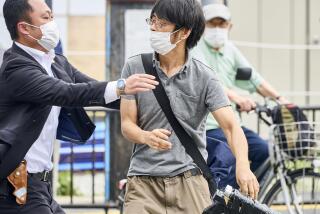Justice System in Japan
- Share via
Your article on criminal justice in Japan (Feb. 27) seriously distorts Japan’s experience. Whatever Japan’s faults, its system of criminal justice cannot accurately be described as backward. By all objective criteria Japan has one of the world’s most effective and humane systems of crime control.
During the past four decades Japan has been able to reduce crime substantially in all categories except for motor vehicle offenses. The only other industrial country to have even contained crime since the end of World War II is Switzerland.
By nearly all accounts Japan’s achievement owes more to community rather than state controls that re-integrate repentant offenders. Even a cursory examination of the descriptions of criminal justice in Japan reveals that confession is considered an essential element for correction, not conviction.
Because, like continental European legal systems, Japan does not have a procedure for guilty pleas that eliminates the necessity for the prosecutors to prove guilt without corroborating evidence, a confession alone is not sufficient in Japan to convict. Japanese police and prosecutors mean what they say when they refer to the need for confessions to learn the “truth.” Physical coercion to obtain confessions has been an extraordinarily rare occurrence in Japan. Most cases have involved political dissidents who have been willing to acknowledge the accuracy of their acts as alleged but not their culpability.
A few other instances have involved persons the authorities are convinced by all available evidence are guilty but who insist on their innocence. Such cases must be understood in context. To convict an innocent person is a considerably more serious matter for Japanese police, prosecutor and judges who, in the absence of a jury, are themselves responsible for such determination in contrast to their American counterparts who are able to plead that the process was fair and shift accountability to a jury.
The critical elements of the correctional process are confession, remorse with victim compensation and pardon. In return, however, the state responds with extraordinary leniency. Fewer than half of all offenders are ever prosecuted. Many are not even reported by the police to the prosecutors. Almost a third of those who are reported and are by their own admission guilty are not prosecuted. And more than half of those who are prosecuted and convicted receive suspended sentences.
Japan has the lowest rate of incarceration of any industrial country. Those who would disparage Japan for its human rights record should take note that with over 10 times as many persons per capita in prison (nearly double South Africa), the United States has become almost a police state in comparison.
JOHN O. HALEY, Professor of Law and East Asian Studies, University of Washington, Seattle
More to Read
Sign up for Essential California
The most important California stories and recommendations in your inbox every morning.
You may occasionally receive promotional content from the Los Angeles Times.













